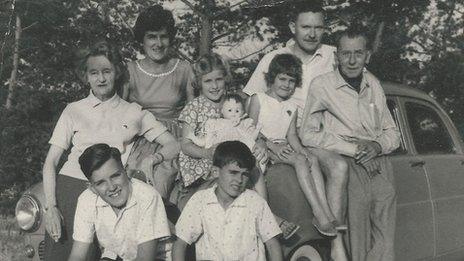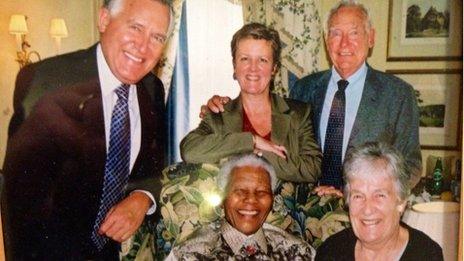MP Peter Hain's story of parents' anti-apartheid fight
- Published
Walter and Adelaine Hain were banned and jailed for fighting apartheid in South Africa
They were unlikely revolutionaries.
The white middle-class architect and his wife enjoyed a privileged life with a maid and a pool at their family home in apartheid South Africa.
But Adelaine and Walter Hain risked everything to campaign against the country's race laws.
More than 50 years later, they still struggle to explain why they rebelled while other whites did not.
"Stubborness," suggested Mrs Hain. "I really sometimes look back on it and wonder if that was the thing we should have done. But we did. Because how do you stop?"
They never stopped despite being briefly jailed by a regime that made them "banned" persons, required to seek special permission to communicate with each other.
She was a rare supportive white face in the public gallery at the trial of Nelson Mandela, "saluted" by the future president from the dock each morning.
She remembered him as a "big strapping chap" and, decades later cried when she saw his "shrunken" frame on leaving jail.
Mandela never forgot the part played by the Hains in the anti-apartheid movement as Mrs Hain discovered much later while in Morriston Hospital, Swansea when she was asked to take a call on the ward phone.
'Extraordinary things'

The Hains risked a life of privilege to campaign against the race laws
She recalls: "He says there's an important person to speak to you. And he comes on the phone and says 'It's Nelson Mandela, do you remember me?'"
Unable to work, the Hains were forced into exile in 1966, leaving for London. Their life of protest went on, often outside the country's embassy (now High Commission) in Trafalgar Square.
On Wednesday, the tables were turned as anti-apartheid campaigners gathered at South Africa House to launch Ad and Wal, their life story, written by their son, Neath Labour MP Peter Hain.
He said: "I felt my mother and father's story needed to be told; an ordinary couple who did extraordinary things, began in very simple, modest ways, ended up becoming notorious, being jailed, being banned and ultimately being forced into exile because of their values and their principles.
"They were not very ideological but it was just their sense of fairness and duty that drove them to support Nelson Mandela's freedom struggle."
Writing the book helped him understand why his parents had done what they did.
"In a way it was easier to understand why black South Africans, who were oppressed so badly, fought against the system," he added.

Nelson Mandela never forgot the part the Hains played in the anti-apartheid movement
"But for white South Africans, that handful, including I'm proud to say my parents, who did so, they were making a sacrifice for their values and their beliefs and their sense of fairness and justice."
Ad and Wal sacrificed a lot to take a stand. Few in their wider family could understand what they did.
Now in their late 80s, they say they made the right decisions.
"You don't stop doing things just because people try to stop you," said Mrs Hain.
Would they do the same again?
"I hope so, she said. "I just hope we would do the same again because it was important.
Her husband nodded and added with a chuckle: "We're a little elderly for it, though."
- Published29 January 2014
- Published6 December 2013
- Published6 December 2013
- Published5 December 2013